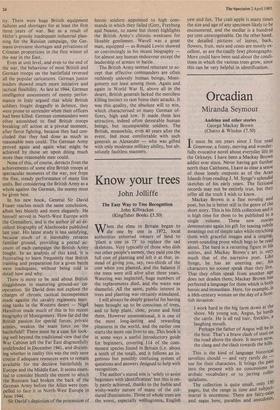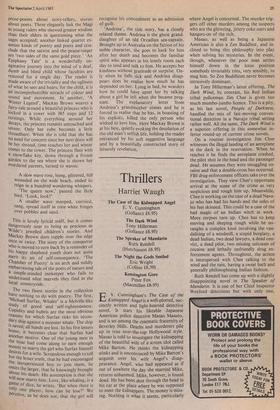Orcadian
Miranda Seymour
Andrina and other stories George Mackay Brown (Chatto & Windus £7.50) Tt must be ten years since I first read
Green voe, a funny, moving and wonder- fully evocative novel about everyday life in the Orkneys. I have been a Mackay Brown addict ever since. Never having got further north than Caithness, I have as clear a sense of those lonely outposts as of the Aran Islands from reading J. M. Synge's splendid sketches of his early years. The fictional records may not be entirely true, but they offer all the truth I wish to know.
Mackay Brown is a fine novelist and poet, but he is better still in the genre of the short story. This is his fifth collection and it is high time for them to be published in a single volume. These new stories demonstrate again his gift for teasing subtle meanings out of simple tales while enriching them with graceful images and a singing, sweet-sounding prose which begs to be read aloud. The bard is a recurring figure in his stories, and Mackay Brown's art is very much that of the narrative poet. Like Synge, he has an unerring ear; his characters no sooner speak than they live. That they often speak from another age does not deaden them; Mackay Brown has perfected a language for them which is both heroic and immediate. Here, for example, is a 16th-century woman on the day of a Scot- tish invasion:
I work hard in the big farm down at the shore. My young son, Angus, he herds the cattle. He is all red hair, freckles, a laughing mouth. Perhaps the father of Angus Will be in the host. That's a brave clash of steel on the road above the shore. It moves now, the clang and the clash towards the hills.
This is the kind of language historical novelists should — and very rarely do — use for their characters. It brings the Past into the present with no concessions to archaic vocabulary or to jarring collo- quialisms. The collection is quite small, only .15° pages, but the range in time and subject- matter is enormous. There are fairy-taies and sagas here, parables and anecdotes,
Prose-poems about story-tellers, stories' about poets. Three elegantly link the Magi as young rulers who showed greater wisdom than their elders in questioning what the sages accepted; another linked quartet ex- amine kinds of poetry and poets and con- clude that the satirist and the praise-singer are 'two sides of the same gold piece.' An Epiphany Tale' is a wonderfully im- aginative journey into the mind of a deaf, dumb and blind child whose faculties are restored for a single day. The reader is made aware of the triviality and the ugliness of what he sees and hears; for the child, it is an incomprehensible miracle of colour and sound and movement. In another, 'A Winter Legend', Mackay Brown weaves a fairy-tale around a beautiful princess who is locked in a tower with 365 steps and 12 turnings. While everything around her decays, the princess remains untouched and serene. Only her robe becomes a little threadbare. When she is told that she has no need for concern since her next dress will be her shroud, time touches her and winter comes to the tower. The princess flees with a snowflake key, down through a frozen garden to the sea where she is shown her Murdered parents, turned to waves: A slow wave rose, hung, glittered, fell wounded on the wide beach, ended its reign in a hundred wondering whispers.
'The queen now,' panted the little bird. 'Look, look !'
A smaller wave stooped, curtsied, sang, spread itself in torn white fringes over pebbles and sand.
This is lovely lyrical stuff, but it Comes dangerously near to being as precious as Wilde's jewelled children's stories. And Mackay Brown does topple over the edge once or twice. The story of the conqueror who is moved to turn back by a reminder of his happy shepherd youth does not quite merit its air, of self-consequence. 'The Chamber of Poetry' is an arch and mildly embarrassing tale of the poets of nature and a simple-minded innkeeper who fails to understand what marvels they find in the local countryside.
The two finest stories in the collection have nothing to do with poetry. The first, 'Michael Surfax, Whaler' is a Melville-like study of greed and self-righteousness. Cupidity and hubris are the most obvious reasons for which Surfax risks his secon- dary ship against a monster whale. The ship 15 saved; all hands are lost In his five letters home, it becomes clear that Surfax had another motive. One of the young men in the boat had come along to earn enough money to marry the girl who Surfax himself desires for a wife. Scrupulous enough to tell her the lesser truth, that he had encouraged the inexperienced boy to join them, he omits the larger, that he knowingly brought about his death. His assumption is that she wiI now marry him. Love, like whaling, is a game of dice, he writes. 'But when there is only one player, how Can he lose?' We Perceive, as he does not, that the girl will
recognise his concealment as an admission of guilt.
'Andrina', the title story, has a closely related theme. Andrina is the ghost grand- daughter of an old Orcadian sea-captain. Brought up in Australia on the fiction of his noble character, she goes to look for him after her death and becomes the familiar spirit who appears in his lonely room each day to tend and talk to him. He accepts her kindness without gratitude or surprise. On- ly when he falls sick and Andrina disap- pears does he realise how much he has depended on her. Lying in bed, he wonders how he could have upset her by talking about a girl he left when she became preg- nant. The explanatory letter from Andrina's grandmother comes and he is forced to realise that he has, in boasting of his exploits, killed the only person who wished to love him. Here Mackay Brown is at his best, quietly evoking the desolation of the old man's selfish life, holding the reader entranced by his soft suggestive language and by a beautifully constructed story of leisurely revelation.







































 Previous page
Previous page